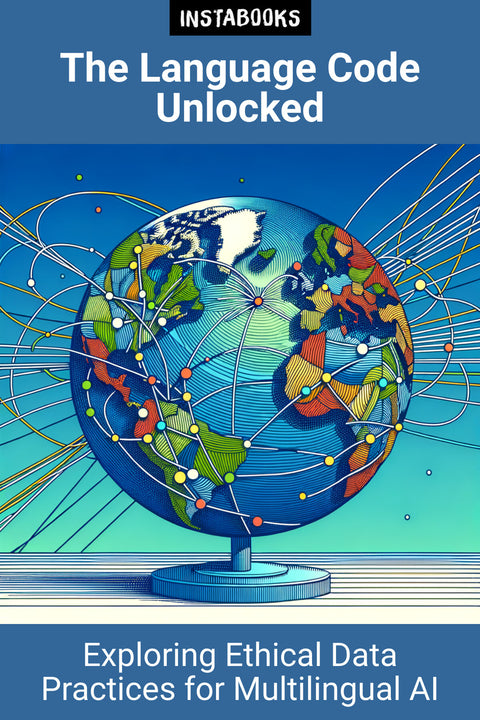
The Language Code Unlocked
Exploring Ethical Data Practices for Multilingual AI
Included:
✓ 200+ Page AI-Generated Book
✓ ePub eBook File — read on Kindle & Apple Books
✓ PDF Print File (Easy Printing)
✓ Word DOCX File (Easy Editing)
✓ Hi-Res Print-Ready Book Cover (No Logo Watermark)
✓ Full Commercial Use Rights — keep 100% of royalties
✓ Publish under your own Author Name
✓ Sell on Amazon KDP, IngramSpark, Lulu, Blurb & Gumroad to millions of readers worldwide
Introduction
In recent years, there's been a seismic shift in how we perceive large language models (LLMs). No longer confined to single languages, a new wave of multilingual LLMs is being designed to include historically underrepresented tongues, challenging the imbalance of linguistic representation in AI. "The Language Code Unlocked" dives deep into the ethical intricacies these advancements entail, particularly focusing on those languages often termed as "low resource" or "long-tail." As these models advance, understanding the responsibilities inherent in their creation becomes ever more pivotal.
Ethical Considerations
Our journey begins with an exploration of ethical frameworks paramount for this discourse. Topics such as consent, cultural safety, and data sovereignty are crucial in ensuring that non-Western languages are represented with integrity. It's essential that the voices of communities, especially those from previously colonized backgrounds, are not only heard but given prominence in guiding AI development. Recognizing and respecting linguistic rights—such as the right to maintain languages and cultural heritage—forms the backbone of this book, ensuring that LLMs serve as allies rather than oppressors.
Algorithmic Colonization and Linguistic Rights
One of the most pressing issues is avoiding algorithmic colonization, a term representing the digital reiteration of historical power imbalances. "The Language Code Unlocked" discusses how data practices might inadvertently perpetuate these imbalances and offers strategies to counteract them. A deep dive into linguistic rights reveals how we can bridge the gap between technological advancement and cultural preservation, ensuring that every linguistic community feels represented rather than marginalized.
Community Partnerships and Engagement
Successful LLM development is undeniably tied to deep, meaningful community partnerships. This book emphasizes the importance of engaging linguistic communities through participatory design and qualitative research. Efforts are dedicated to ensuring that data collection processes are not just compliant but beneficial to communities, addressing tendencies to decontextualize languages and instead, celebrating their rich, diverse contexts.
Recommendations and Future Directions
To wrap up this comprehensive guide, "The Language Code Unlocked" provides twelve actionable recommendations for ethical data collection. These are the blueprints for developing multilingual LLMs responsibly. These include ensuring inclusive data collection, fostering transparency, and building long-term collaborations with affected communities. The future, as envisaged, is one where AI not only understands multiple languages but does so with humility, sensitivity, and profound respect for every word uttered.
Table of Contents
1. Introduction to Multilingual LLMs- The Rise of Language Models
- Multilingual Expansion
- Challenges and Opportunities
2. Understanding Ethical Frameworks
- Importance of Consent
- Cultural Safety Measures
- Data Sovereignty Explained
3. Algorithmic Colonization
- Identifying Power Imbalances
- Avoiding Historical Reiteration
- Changing the Narrative
4. Embracing Linguistic Rights
- Language as Culture
- Rights and Representation
- Preserving Heritage
5. Community Engagement Strategies
- Participatory Design
- Building Trust
- Collaborative Processes
6. Conducting Qualitative Research
- Methods and Approaches
- Understanding Nuances
- Implementing Findings
7. Involving Communities in Design
- Partnership Models
- Feedback Mechanisms
- Case Studies
8. Addressing Cultural Bias
- Recognizing Prejudice
- Training for Sensitivity
- Strategies for Inclusion
9. Ensuring Data Transparency
- Clear Communication
- Ethical Guidelines
- Empowering Users
10. Recommendations for Ethical Practices
- Inclusive Data Collection
- Long-term Collaboration Models
- Documenting Practices
11. Challenges in Multilingual Data Collection
- Common Obstacles
- Mitigation Techniques
- Case Examples
12. Conclusion & Future Perspectives
- Summarizing Key Insights
- Directions Forward
- Calls to Action
Target Audience
This book is intended for AI researchers, data scientists, sociolinguists, and ethical AI enthusiasts interested in ethical data practices for multilingual LLMs.
Key Takeaways
- Understand the ethical frameworks essential for multilingual language model development.
- Identify and address algorithmic colonization and its impact on communities.
- Learn effective community engagement and participatory design strategies.
- Explore real-world case studies and implement best practices in ethical data collection.
- Gain insights into preserving linguistic rights and ensuring data sovereignty.
- Receive practical recommendations for culturally sensitive AI development.
